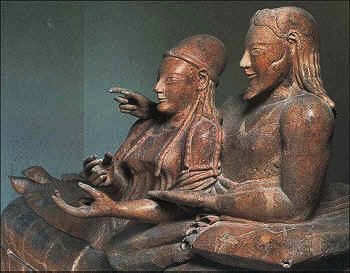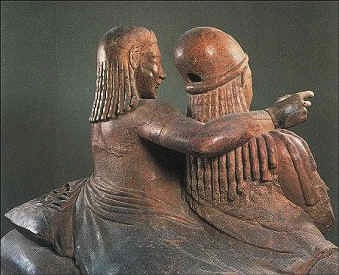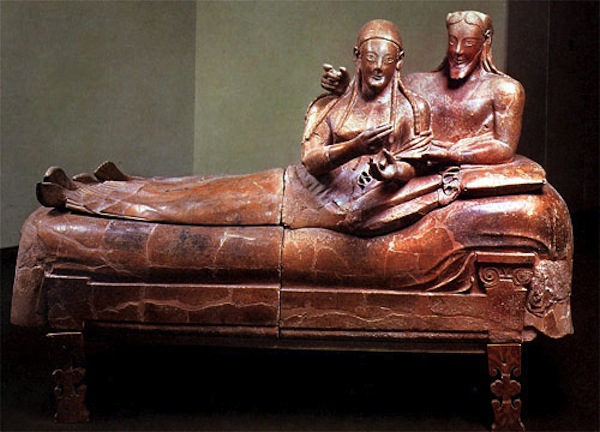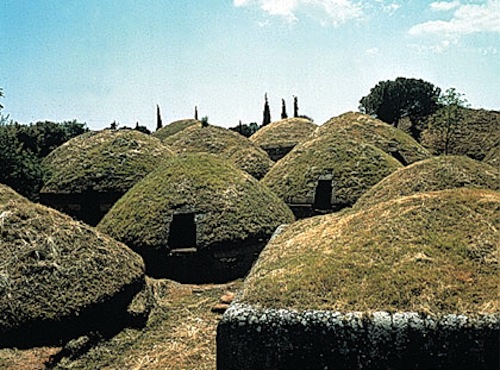Despite their extensive historical legacy, the Romans were not the only ancient civilization to populate Italy. The Etruscans were a tribe located in what is currently known as Tuscany, though the famous historian Herodotus traces their origins to Asia Minor. As a people, the Etruscans were less militaristic than the Romans, and therefore were eventually subjugated by them. Most of what remains of the Etruscan language is inscribed on funereal artifacts, and while their alphabet is derived from the Greeks, it is indecipherable due to their unique assemblage of letters into unfamiliar words.
 Most of what we know of the Etruscans is either gleaned from the pictorial art found in their tombs, or mentioned in the sideline commentary of their Eastern neighbors, the Greeks. According to them, the Etruscans were highly artistic, practiced haruspicy and also engaged in ‘backward’ social customs that allowed their women to participate in the discourse of symposia: dinner parties where attendants would recline on couches, drink red wine and enjoy conversations and entertainment. The Greeks, in comparison, kept their women under-educated and homebound, where they were barred from an equal footing in every social capacity.
Most of what we know of the Etruscans is either gleaned from the pictorial art found in their tombs, or mentioned in the sideline commentary of their Eastern neighbors, the Greeks. According to them, the Etruscans were highly artistic, practiced haruspicy and also engaged in ‘backward’ social customs that allowed their women to participate in the discourse of symposia: dinner parties where attendants would recline on couches, drink red wine and enjoy conversations and entertainment. The Greeks, in comparison, kept their women under-educated and homebound, where they were barred from an equal footing in every social capacity.
The Etruscans were in power from the 8th to 3rd century B.C.E, and habitually built their cities on hills. As was common practice by the Greeks and Romans, the Etruscans also buried their dead in a necropolis, literally translated as ‘city for the dead.’ Ancient people were sensible enough to remove corpses from where they lived to avoid exposure to disease. Etruscan necropolises, such as Cerveteri and Tarquinia, were extensive with networks of roads linking a constellation of hive-like structures.
 The most noteworthy artistic pieces from the Etruscan gravesites are their terracotta sarcophagi. The etymology of the term ‘sarcophagus’ translates to ‘swallowed by the earth,’ (the same Greek root is found in other words like ‘esophagus’). The Etruscans practiced both inhumation and cremation throughout the course of their civilization, and alternated between placing ashes and bodies in their tombs.
The most noteworthy artistic pieces from the Etruscan gravesites are their terracotta sarcophagi. The etymology of the term ‘sarcophagus’ translates to ‘swallowed by the earth,’ (the same Greek root is found in other words like ‘esophagus’). The Etruscans practiced both inhumation and cremation throughout the course of their civilization, and alternated between placing ashes and bodies in their tombs.
The most striking example of their work is the Sarcophagus of the Spouses, now located in the Villa Guilia in Rome. This sarcophagus is comprised of four pieces, as it had to be broken down in manageable segments to be fired in a kiln. The figures are life size, and display a plasticity of form that is more anthropoidal than realistic. Their almond-shaped eyes and ovoid features give them an otherworldly and elfish quality.
The man and woman are reclining together at a symposium. The mood is jovial and celebratory, as evidenced from their relaxed smiles, his gentle embrace of her and her hands in the gesture of an offering. The torsos of the couple are ramrod straight, and this strong verticality implies a triumphal ascendance over their earthly demise. In contrast, their legs are stiff, less voluminous and bear the rigor mortis rigidity of true corporeal death. The juxtaposition of these elements within the couples’ figures reveals an inherent dualism in the Etruscans’ outlook on death: on one hand, an unflinchingly direct depiction, and on the other, a transcendently romantic embrace of the afterlife.
Read part 2 here.
Further Recommendations:
Read more about the Etruscans here.
A video on the archeological discovery of an Etruscan house.
More on their mysterious language.
Related Articles:
- A Few Etruscan Tombs (raxacollective.wordpress.com)
- Near Eastern Origin of Etruscans (tonynetone.wordpress.com)
- Etruscan mtDNA origins (Ghirotto et al. 2013) (dienekes.blogspot.com)

 Etruscan Sarcophagi and the Marriage Bed (Part 1 of 2)
Etruscan Sarcophagi and the Marriage Bed (Part 1 of 2)




 The Other Death in the Family
The Other Death in the Family

 The Healing Sound of Singing Bowls
The Healing Sound of Singing Bowls














